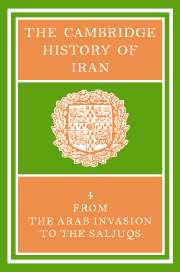Book contents
- Frontmatter
- 1 THE ARAB CONQUEST OF IRAN AND ITS AFTERMATH
- 2 THE ‘ABBĀSID CALIPHATE IN IRAN
- 3 THE ṬĀHIRIDS AND ṢAFFĀRIDS
- 4 The SĀMĀNIDS
- 5 THE EARLY GHAZNAVIDS
- 6 THE MINOR DYNASTIES OF NORTHERN IRAN
- 7 IRAN UNDER THE BŪYIDS
- 8 TRIBES, CITIES AND SOCIAL ORGANIZATION
- 9 THE VISUAL ARTS
- 10 NUMISMATICS
- 11 THE EXACT SCIENCES
- 12 LIFE SCIENCES, ALCHEMY AND MEDICINE
- 13(a) PHILOSOPHY AND COSMOLOGY
- (b) SŪFISM
- 14 THE RELIGIOUS SCIENCES
- 15 SECTS AND HERESIES
- 16 NĀSIR-I KHUSRAU AND IRANIAN ISMĀ‘ĪLĪSM
- 17 ZOROASTRIAN LITERATURE AFTER THE MUSLIM CONQUEST
- 18 ARABIC LITERATURE IN IRAN
- 19 THE RISE OF THE NEW PERSIAN LANGUAGE
- 20 (a) THE “RUBĀ'Ī” IN EARLY PERSIAN LITERATURE
- (b) ‘UMAR KHAYYĀM: ASTRONOMER, MATHEMATICIAN AND POET
- Bibliography
- Index
- Plate section
- Plate section">
- Map 1. Iran under the Abbasids">
- References
2 - THE ‘ABBĀSID CALIPHATE IN IRAN
Published online by Cambridge University Press: 28 March 2008
- Frontmatter
- 1 THE ARAB CONQUEST OF IRAN AND ITS AFTERMATH
- 2 THE ‘ABBĀSID CALIPHATE IN IRAN
- 3 THE ṬĀHIRIDS AND ṢAFFĀRIDS
- 4 The SĀMĀNIDS
- 5 THE EARLY GHAZNAVIDS
- 6 THE MINOR DYNASTIES OF NORTHERN IRAN
- 7 IRAN UNDER THE BŪYIDS
- 8 TRIBES, CITIES AND SOCIAL ORGANIZATION
- 9 THE VISUAL ARTS
- 10 NUMISMATICS
- 11 THE EXACT SCIENCES
- 12 LIFE SCIENCES, ALCHEMY AND MEDICINE
- 13(a) PHILOSOPHY AND COSMOLOGY
- (b) SŪFISM
- 14 THE RELIGIOUS SCIENCES
- 15 SECTS AND HERESIES
- 16 NĀSIR-I KHUSRAU AND IRANIAN ISMĀ‘ĪLĪSM
- 17 ZOROASTRIAN LITERATURE AFTER THE MUSLIM CONQUEST
- 18 ARABIC LITERATURE IN IRAN
- 19 THE RISE OF THE NEW PERSIAN LANGUAGE
- 20 (a) THE “RUBĀ'Ī” IN EARLY PERSIAN LITERATURE
- (b) ‘UMAR KHAYYĀM: ASTRONOMER, MATHEMATICIAN AND POET
- Bibliography
- Index
- Plate section
- Plate section">
- Map 1. Iran under the Abbasids">
- References
Summary
On 3 Rabī' I 132/20 October 749 Abu'l-'Abbās ‘Abd-Allāh b. Muhammad b. ‘Aī b. ‘Abd-Allāh b. al-‘Abbās, after receiving the oath of allegiance as caliph, spoke in the mosque of Kūfa until, weakened by fever, he sat down in the pulpit while his uncle finished the speech for him. The speech served as an inaugural address for this first 'Abbāsid caliph and clearly outlined both the discontents which had encouraged the revolution against the Umayyads, and the claims of the 'Abbāsids to restrict the caliphate of the Islamic community to the members of their own family. Even if the authenticity of the speech is difficult to establish, it faithfully reflects the tone of 'Abbāsid rule during the following two hundred years:
Praise be to God … who has given us ties of relation and kinship with the Messenger of God, and has brought us forth from his fathers … and has placed us in respect to Islam and its people in an exalted position … He has informed them of our excellence and made it obligatory for them to render us our right and to love us … The erring Sabā'iyya have claimed that someone other than us has a greater right than we to leadership, administration and the caliphate … How so and why so, oh people? It is through us that God has guided men after their erring and enlightened them after their ignorance … God tolerated [the Umayyad usurpers] for a while, until they angered Him; and when they angered Him, He avenged Himself on them at our hands and returned our right to us … Oh people of Kūfa, you are the object of our love and affection. You have been constant in that love, your mistreatment by the oppressors has not turned you from it until you reached our time and God brought you our turn in power (daula), and so you have become the happiest of people through us and the most honoured by us. We have increased your [yearly] stipends by one hundred dirhams. Hold yourselves ready, for I am the pitiless bloodshedder (al-saffāh) and the destroying avenger.
- Type
- Chapter
- Information
- The Cambridge History of Iran , pp. 57 - 89Publisher: Cambridge University PressPrint publication year: 1975
References
- 3
- Cited by

